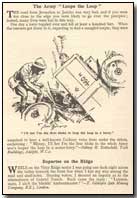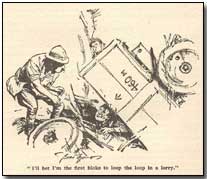Memoirs & Diaries - The Best 500 Cockney War Stories - The Army "Loops the Loop" and Other Stories
 Published in London
in 1921, The Best 500 Cockney War Stories
comprised, in the words of its newspaper publisher (The London Evening
News) "a remembering and retelling of those war days when laughter
sometimes saved men's reason".
Published in London
in 1921, The Best 500 Cockney War Stories
comprised, in the words of its newspaper publisher (The London Evening
News) "a remembering and retelling of those war days when laughter
sometimes saved men's reason".
The collection of short memoirs, some 500 in total, is divided into five categories - Action, Lull, Hospital, High Seas and Here and There. This page contains five stories from Lull, led by The Army "Loops the Loop".
Other sections within the collection can be accessed using the sidebar to the right.
The Army "Loops the Loop"
The road from Jerusalem to Jericho was very bad, and if you went too close to the edge you were likely to go over the precipice; indeed, many lives were lost in this way.
One day a lorry toppled over and fell at least a hundred feet. When the rescuers got down to it, expecting to find a mangled corpse, they were surprised to hear a well-known Cockney voice from under the debris, exclaiming: "Blimey, I'll bet I'm the first bloke in the whole Army wot's looped the loop in a motor-lorry."
Sidney H. Rothschild, York Buildings, Adelphi, W.C.2
Repartee on the Ridge
While on the Vimy Ridge sector I was going one dark night across the valley towards the front line when I lost my way among the mud and shell-holes.
Hearing voices, I shouted an inquiry as to the whereabouts of Gabriel Trench.
Back came the reply: "Lummie, mate, I ain't the blinkin' harbourmaster!"
T. Gillespie (late Mining Company, R.E.), London
A New Kind of "Missing"
A battalion of the 47th London Division was making its first journey to the front line at Givenchy.
As we were proceeding from Bethune by the La Bassee Canal we passed another crowd of the same Division who had just been relieved. We were naturally anxious to know what it was like "up there," and the following conversation took place in passing:
"What's it like, mate?"
"All right."
"Had any casualties?"
"Yes, mate, two wounded, and a bloke lost 'is 'at."
F. G. Nawton, (ex-Major 15th Batt. M.G.C.), 2 Kenton Park Road, Kenton, Middlesex
And it Started with a Hen Raid!
While we were behind the line in March 1918 some chickens were stolen from the next village and traced to our billet by the feathers.
As the culprits could not be found our O.C. punished the whole company by stopping our leave for six months.
A few days later we "moved up" just as Jerry broke through further south.
The orderly sergeant one night read out orders, which finished up with Sir Douglas Haig's famous dispatch ending with the words: "All leave is now stopped throughout the Army till further orders."
Thereupon a tousled head emerged from a blanket on the floor with this remark: "Blimey, they mean to find out who pinched those blinking chickens."
J. Slack, 157 Engadine Street, Southfields, S.W.18
"I'm a Water-Lily"
This incident took place on the Neuve Chapelle front early in 1916.
Our platoon was known as the "Divisional Drainers," for it was our job to keep the trenches as free from water as possible.
One day, while we were working in a very exposed drain about three feet deep, Jerry was unusually active with his whizz-bangs, and we were repeatedly shelled off the job.
During one of our periodical "dives" for cover, one of the boys (a native of Canning Town) happened to be "left at the post," and instead of gaining a dry shelter was forced to fling himself in the bottom of the drain, which had over two feet of weedy water in it.
Just as he reappeared, with weeds and things clinging to his head and shoulders, an officer came to see if we were all safe.
On seeing our weed-covered chum he stopped and said, "What's the matter, Johnson? Got the wind up?"
Johnson, quick as lightning, replied, "No, sir; camouflage. I'm a water-lily."
F. Falcuss (late 19th Batt. N.F.), 51, Croydon Grove, West Croydon
Next - Not Knowin' the Language and four other stories
A "Bangalore Torpedo" was an explosive tube used to clear a path through a wire entanglement.
- Did you know?

